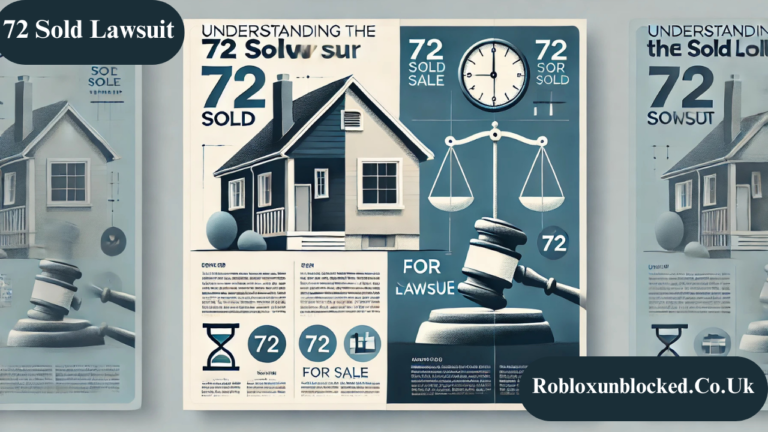The real estate market is constantly evolving, and with it, various selling methods have emerged to attract homeowners. One such method is the 72 Sold program, which claims to facilitate faster home sales at competitive prices. However, like any business model, it’s not without controversy. In recent years, the 72 Sold lawsuit has raised questions about the program’s practices and its implications for homeowners and real estate agents alike. This article will explore what the 72 Sold lawsuit entails, its background, key issues, and its impact on the real estate industry.
What is the 72 Sold Program?
Before diving into the lawsuit, it’s crucial to understand what the 72 Sold program is. Founded by Arizona-based real estate agent Greg Hague, 72 Sold aims to sell homes in a rapid, streamlined process, with a promise that homeowners can receive offers within 72 hours. The program promotes a unique selling strategy that includes:
- Aggressive Marketing: The company employs extensive marketing tactics to attract potential buyers quickly.
- Pre-inspection: Homes are often pre-inspected, which can lead to fewer surprises during the sale process.
- Bidding Process: The program encourages multiple offers, potentially leading to higher sales prices.
While this approach appeals to many sellers looking for a fast and efficient sale, it has also been scrutinised, resulting in the 72 Sold lawsuit.
Background of the 72 Sold Lawsuit
The 72 Sold lawsuit originated from concerns raised by both consumers and real estate professionals regarding the program’s operational practices. As the program gained popularity, some participants began reporting issues, prompting legal action. The lawsuit claims that the program may engage in misleading practices, including:
- Unclear Fees: Critics argue that the program does not transparently disclose all fees associated with its services.
- Marketing Tactics: Some homeowners have claimed that the aggressive marketing strategies employed can mislead sellers about the actual selling price of their homes.
- Real Estate Agent Concerns: Traditional real estate agents have raised alarms about the impact of 72 Sold on their business model, claiming it undermines established practices and can result in unfair competition.
Key Issues Raised in the Lawsuit
The 72 Sold lawsuit highlights several significant issues concerning the program’s operations. Below are some of the primary concerns raised:
1. Misrepresentation of Services
One of the central claims of the lawsuit revolves around the alleged misrepresentation of the program’s services. Homeowners have reported feeling misled about the benefits of the 72 Sold approach, believing it guarantees a higher sale price or faster sale than traditional methods. This perception can lead sellers to choose 72 Sold over more conventional real estate services without fully understanding the potential drawbacks.
2. Lack of Transparency in Fees
Transparency in real estate transactions is crucial for building trust between sellers and agents. The lawsuit alleges that 72 Sold does not provide a clear breakdown of its fees upfront. Homeowners may find themselves surprised by additional costs that were not disclosed at the outset, which can result in frustration and mistrust.
3. Impact on Traditional Agents
The rise of alternative selling programs like 72 Sold has raised concerns among traditional real estate agents. Many agents argue that the program’s aggressive marketing and unique selling tactics could lead to decreased commission opportunities for agents, as sellers may opt for the streamlined approach instead. This tension between traditional practices and modern methods is a significant point of contention in the lawsuit.
Implications of the 72 Sold Lawsuit
The outcome of the 72 Sold lawsuit could have wide-ranging implications for both homeowners and the real estate industry. Here are some potential consequences:
1. Regulatory Scrutiny
As the lawsuit unfolds, regulatory bodies may take a closer look at the practices of alternative real estate programs like 72 Sold. This scrutiny could lead to new regulations aimed at ensuring transparency and protecting consumer rights within the real estate market.
2. Reassessment of Business Models
If the lawsuit results in significant findings against 72 Sold, it could prompt a reassessment of their business model. The program may need to adapt its practices to comply with legal requirements, which could include clearer communication about fees and more accurate representations of services.
3. Influence on Consumer Choice
The lawsuit may influence consumer perceptions of 72 Sold and similar programs. If negative information about the program emerges during the legal proceedings, it could deter potential sellers from using their services, leading to a shift back toward traditional real estate practices.
What Homeowners Should Know
For homeowners considering the 72 Sold program, it’s essential to conduct thorough research before making a decision. Here are some tips for prospective sellers:
1. Understand the Process
Before signing any agreements, ensure you fully understand the 72 Sold process, including how offers are generated, what marketing strategies will be used, and any associated fees.
2. Compare Options
Don’t hesitate to compare the 72 Sold program with traditional real estate services. Obtaining multiple quotes and proposals can provide valuable insight into which option best aligns with your needs and goals.
3. Ask Questions
If you decide to explore the 72 Sold program, ask questions about everything from fees to the timeline of the sale. A reputable real estate service should be willing to provide clear answers and explanations.
4. Stay Informed About Legal Developments
Keeping abreast of the 72 Sold lawsuit and its outcomes can help you make informed decisions. Legal developments may influence how the program operates in the future and affect its attractiveness to potential sellers.
Conclusion: The Future of 72 Sold and the Real Estate Market
The 72 Sold lawsuit underscores the complexities of the evolving real estate landscape. As alternative selling methods gain traction, legal and ethical considerations will play a critical role in shaping consumer trust and industry practices. Homeowners should approach these new models with caution, ensuring they understand the implications before proceeding. Ultimately, the resolution of the lawsuit may redefine how programs like 72 Sold operate, influencing both sellers and real estate professionals for years to come.
